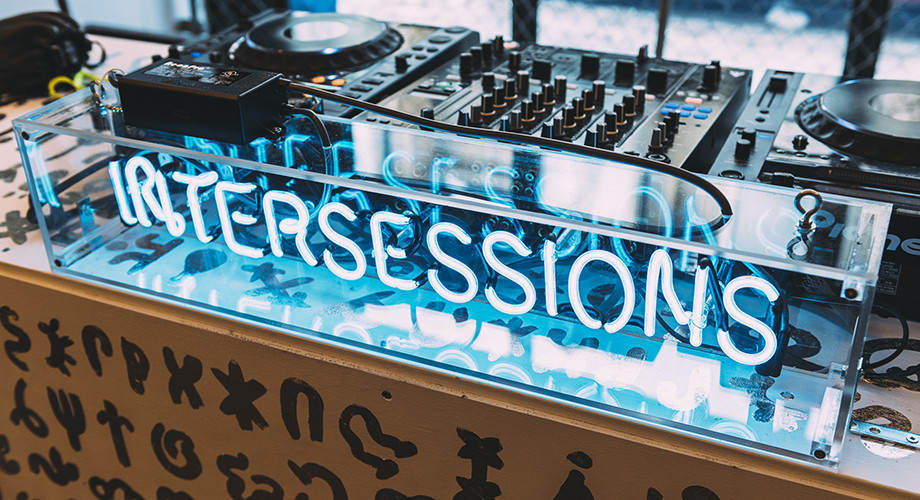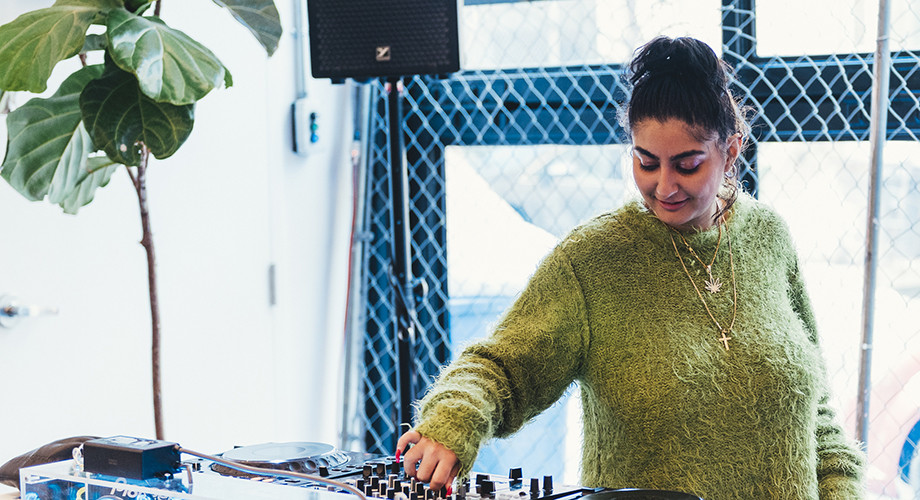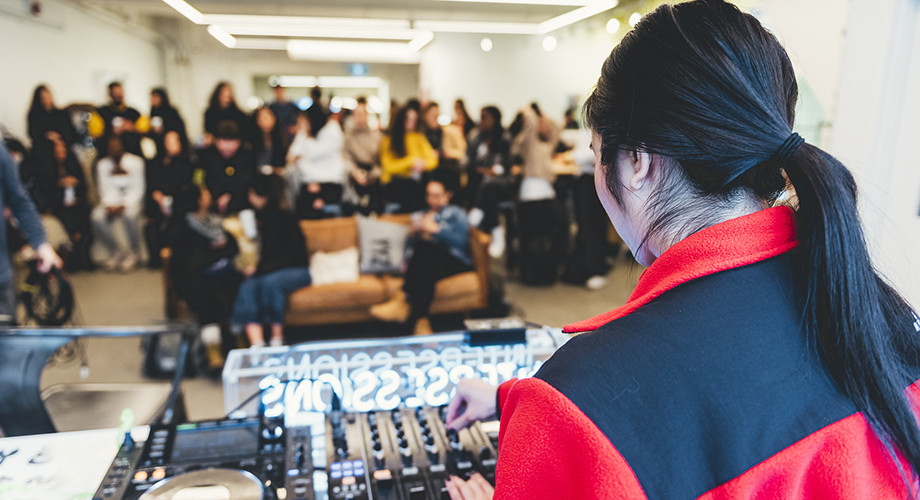In the Blog
Chipping Away: Intersessions works to fix the gender imbalance in dance music

Image: Sarah Bodri
Sometimes you can change the game by chipping away at the old rules. That seems to be the ammo of Chhavi Nanda, a rapper, DJ and promoter turned music scene activist better known as Chippy Nonstop. On social media, Chippy is equal parts outrageous persona and accurate observer of modern culture. Her Twitter feed is full of all-capital letter Tweets about topics ranging from intersectional feminism to last night’s party. Her Instagram is comprised of videos of her DJing at the club—twerking on couches and wearing outlandish outfits like a red, sparkly bikini—alongside photos of her running panel discussions on how to throw inclusive parties. Chippy pairs provocative and outlandish behaviour with an in-your-face call for gender equality in the dance music scene through her own project, Intersessions.
Born in Dubai of Indian descent, Chippy grew up in Zambia and Canada before relocating to the United States as a teenager. She had begun to make a name for herself as a rapper and DJ in the underground music scene—working with Kreayshawn and Mad Decent and getting featured on a Major Lazer track—before visa issues led to a very public deportation in 2015. Returning to Canada, Chippy found herself in Vancouver, becoming increasingly frustrated with its music industry.
The industry was filled with what she refers to as ‘gatekeepers,’ older and more established DJs and promoters (mostly men) who weren’t interested in letting anyone new onto the scene, particularly a young, female person of colour like herself. Chippy wanted to see more diversity in the industry and, when the opportunity arose, decided to throw a workshop to teach women how to DJ. The response was overwhelmingly positive, and Chippy realized how many individuals were interested in learning DJ and production skills in a safe, inclusive, and non-judgemental environment. In response, Chippy began Intersessions, a workshop series aimed at teaching women, LGBTQ+ people, and people of colour how to DJ and produce music.

Chippy Nonstop. Image: Sarah Bodri
Since 2016, Intersessions has thrown over 100 workshops across North America and Europe. For each event, Chippy, or one of her collaborators, find three local teachers—she has spreadsheets of suitable candidates—to help with instruction. The DJ workshops begin with a panel discussion on topics ranging from sexual harassment in the industry to organizing music and finding quality downloads. The sessions then break out into stations where, on various forms of commonly used DJ equipment—usually Traktor, Serato, CDJs or vinyl—instructors teach technical skills like beatmatching and equipment setup. Production workshops follow a similar format, and Intersessions has also begun holding a variety of community events geared towards making spaces safer. While the sessions are intended for women and minorities—those who have historically seen less representation in the music industry—anyone is welcome.
Chippy thinks that regardless of personality, anyone can be a DJ. Gender, race, or sexual orientation shouldn’t matter, but the technical skills do.
‘Having confidence in skills is important,’ Chippy says. She thinks that people often decide they want to become DJs before having any idea how technical it is. To be a DJ, you need to be able to set up equipment, understand sound quality, and know how to properly mix tracks together.
‘People don’t take it into consideration,’ she says. ‘But it’s important to hone all your skills before you play out. That’s why this space is important.’ More recently, Intersessions has partnered with Lululemon to present the Intersessions Clubhouse, an interactive installation in the hustle space at the back of a Lululemon store on Queen Street West in Toronto. A brightly lit space filled with couches, art installations designed by artist Camille Fuzz and a DJ booth with ‘Intersessions’ spelled out in cursive, neon-sign letters, it has so far played host to a CDJs and Vinyl Beginners workshop, a community meeting and a talk on how to throw inclusive parties. It’s also open daily for DJs to come and practice on equipment, with teachers like Chippy available to instruct and give feedback. While the Lululemon Clubhouse closes at the end of April, a May workshop and BBQ at Stackt Market, along with other partnerships, are currently in the works.

Toronto DJ Asey. Image: Sarah Bodri
For a young DJ like Jessica Bayot, AKA Jeka, Intersessions workshops and the Clubhouse have been instrumental to her development. A 22-year old first generation Canadian of Filipino descent, Bayot grew up playing the piano and trumpet in school. But as she got older, she began expanding her knowledge, listening to the music her parents grew up with, like disco and rock, alongside different genres like R&B, dancehall, trap, and Afrobeats.
‘I spent a lot of time making playlists on my Spotify account for every mood and would always share my playlists with friends,’ Bayot says. ‘I was always receiving positive feedback on my playlists and that’s when it clicked that I should become a DJ.’
After attending some DJ workshops, Bayot’s brother, who had taught her the basics, sent her a flyer for Intersessions. She knew she had to be a part of it, particularly since it was run by all women. Bayot began attending sessions where she had the chance to learn how to use DJ equipment and hear how some of the biggest female DJs in Toronto got to where they are now. More recently, Bayot has frequented the Intersessions Clubhouse to practice on CDJs, expensive, industry-standard equipment to which she otherwise wouldn’t have had access. She also began to network with more established DJs, including Chippy.
‘I had a lot of self-doubt regarding my ability to DJ, which is why I held off on playing out for some quite some time,’ Bayot says. ‘I remember having Chippy listen to me spin and asking her, “Well, what do you think?” She was very encouraging and told me I was ready to play out, but I was still very hesitant. Chippy ended up booking me for my first gig shortly after.’
Bayot played her first show with Chippy and JayemKayem—a female DJ who also works with Intersessions—and she considers both to be her role models. ‘The music industry has been male dominated, but those two have managed to rise above and become very successful,’ Bayot says. ‘I think it’s great that the two of them use the platform that they have now to put on new upcoming DJs like myself.’
Along with giving people the technical skills they need to succeed, Chippy believes that Intersessions workshops and popups like the Clubhouse at Lululemon are valuable in creating a community. ‘It’s a good way of meeting people,’ Chippy says, and it’s also a way of potentially getting future gigs. ‘Even if I’m not throwing a party, I’m telling people, they’re really good.’
Bayot believes that being a part of the Intersessions community has made her a lot more comfortable breaking into the music scene. ‘Intersessions has helped out greatly in getting me over the intimidation factor,’ Bayot says. ‘I’ve had a fear of feeling like I don’t belong in the music scene since I’m young, still very new to DJing’ But, she continues, ‘It’s amazing to see what Intersessions has done for me and other upcoming female DJs, as well. The Intersessions community consists of a very diverse group of individuals varying in race, age, ethnicity, sexual orientation and gender. It is through Intersessions that we are all able to come together and share our love for music.’
If there are rules in the music industry, or in business more broadly, on how to conduct yourself, Chippy doesn’t follow them. But whether you’re a fan of her larger than life presence or not, she deserves some serious respect. While lots of people are talking about gender imbalances in the music scene, she’s actively giving women, LGBTQ+ people and people of colour the technical skills and connections they need to get started. And by widening the pool of skilled DJs and making it more inclusive, she’s also making it harder for booking agents and promoters to use the old excuse that lineups are male dominated because men are what’s available.
Beyond creating a space for educating and passing along knowledge, Nonstop is also giving a lesson on individuality. By remaining unapologetically herself, Nonstop is proving to a younger generation that you don’t have to compromise who you are to be successful. You don’t have to fit a cookie-cutter image of what a DJ or music industry professional is supposed to be, you don’t have to act like one of the bros, and you don’t need to follow the old rules.
You can create change in an industry by making waves and doing something different. Especially if you’re willing to put in the effort, nonstop.



